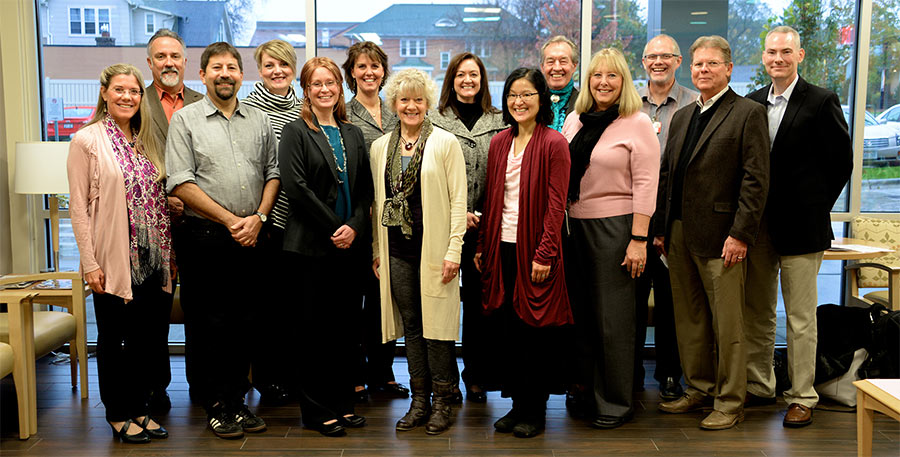
The DFMCH’s integrative health team met with key leaders from the Veterans Health Administration and Pacific Institute for Research and Evaluation to discuss the next phase of the Whole Health initiative.
A new contract, expanded course offerings for clinicians and an inspiring visit from key Veterans Health Administration (VHA) leaders mark the next phase of the Department of Family Medicine and Community Health’s (DFMCH) involvement in the Whole Health initiative.
Whole Health’s First Steps
The initiative aims to advance a “whole person” approach to health care—one in which health care teams partner with patients to look beyond traditional disease management and wellness approaches and work to co-create health and well-being.
The Whole Health approach encourages people to reflect on what matters most to them and how it relates to their health. It emphasizes self-care, prevention, and the evidence-informed use of conventional and complementary care. This broader lens supports the health care partnership, and aids patient healing and clinician fulfillment.
In 2013, the VHA—working through a subcontract with Pacific Institute for Research and Evaluation (PIRE)—selected the DFMCH’s integrative health program to develop a curriculum in support of the Whole Health model of care.
The team developed an initial course, “Whole Health: Change the Conversation,”, which has since been taught 50 times to over 2,000 VHA clinicians nationwide. It’s changing practice behaviors, according to an October 2016 article published in Family Medicine.
In addition, the team developed a supplemental online curriculum to help clinicians better understand and implement the Whole Health model. The peer-reviewed curriculum contains 35 evidence-based educational modules and over 200 point-of-care clinical tools.
New Advanced Courses on Pain Management, Personal Health Planning
Now 15 months into a new five-year contract, the integrative health team has piloted two advanced Whole Health education programs for the VHA.
In one program, “Whole Health for Pain and Suffering: An Integrative Approach,” clinicians learn complementary approaches to pain care, including manual therapies, acupuncture, nutrition and mind-body techniques. They also reflect on their own whole health needs, which can help lessen their risk of burnout while caring for patients in pain.
“Because of the widespread national concern around opioid use in the United States, this course has proven to be especially timely,” explains Adam Rindfleisch, MD, who leads the project for the DFMCH.
“Complementary and integrative health is specifically mentioned in the recently-passed Comprehensive Addiction and Recovery Act as a required part of clinical and educational initiatives related to opioid prescribing at the VHA.”
The other program, “Personal Health Planning in Your Practice: Making It Real,” helps clinicians and teams understand the role of personal health planning in the co-creation of health and well-being and how to implement it in the clinical setting.
Whole Health for the VHA’s Future
In October 2016, VHA Office of Patient Centered Care and Cultural Transformation (OPCC&CT) Executive Director Tracy Gaudet, MD, along with other representatives from the VHA and PIRE, visited the DFMCH to talk more about how the Whole Health model represents a “radical redesign” in health care—and how the VHA is embracing this shift.
In her presentation, she explained the ways the Whole Health model is currently being implemented at the VHA, and cited a New England Journal of Medicine article affirming that the model is a key component of the VHA’s proposed future delivery system.
Dr. Gaudet emphasized that human care, self care and clinical care are equally critical to improving patient empowerment, Veteran satisfaction, access, outcomes and costs—and fostering trust. She also noted that the Whole Health approach extends into establishing relationships throughout the community.
“The role that we are together playing in creating that future is exciting,” she expressed.
Also in October, the directors of the 18 VHA networks across the U.S. initiated a bold plan to establish Whole Health demonstration sites in each region in fiscal year 2018.
The VHA OPCC&CT is actively developing the education plan to meet this expansion. The UW and PIRE will continue to play a critical role in developing and delivering curriculum, and training representatives from these regions how to apply the Whole Health approach in their practices and personal lives.
Published: January 2017
